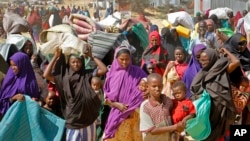The U.N. office for the coordination of humanitarian affairs, OCHA, reports an estimated 2.7 million Somalis will face severe food shortages over the coming months as drought conditions affect more areas in the country.
Somalia’s decade-long drought continues to chip away at people’s ability to cope with this seemingly never-ending disaster. The worst has not yet come to pass. The U.N. reports pre-drought conditions already can be seen in parts of Somaliland, Puntland, Hirshabelle, Galmudug and Jubaland states.
OCHA spokesman, Jens Laerke, says people in these areas, who have barely recovered from last year’s poor seasonal rains, are facing a similarly grim situation this year.
“Tens of thousands of people in Somalia have been forced to leave their homes since November because of extreme water shortages, and forecasts now indicate that the current rainy season, which runs from March to June, will only deliver below average rainfall,” said Laerke.
Relief agencies report two consecutive seasons of scant rain results in crop failure, poor livestock production, and acute food insecurity. Laerke says the hunger crisis in Somalia will be at its worst between April and June. Among the estimated 2.7 million Somalis affected he says are 840,000 children under age five.
“That is an increase of more than 65 percent compared to current levels," said Laerke. "Water shortages will also increase the risk of disease outbreaks… The loss of rain-fed pasture is threatening the survival of livestock which is the foundation of many Somalis’ livelihoods. Displaced people have told OCHA that they are moving in search of water and pasture for their animals.”
The United Nations has appealed for $1 billion to provide life-saving assistance this year to four million people in Somalia affected by conflict, climate change and COVID-19. Laerke says only 2.5 percent of that funding has been received, a sum well below that needed to help Somalia cope with this emergency.




